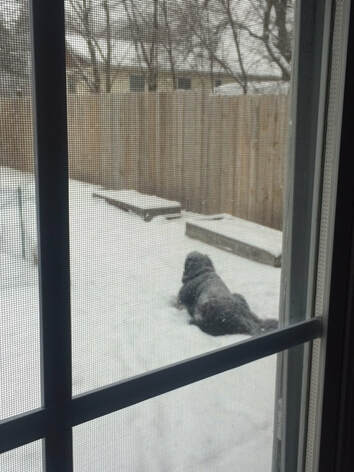|
Today was finals' day at my school. I tasked my AP Literature and Composition students with writing an on-demand poetry analysis. After the 40 minutes was up, one student came up to me and said, "I didn't write an essay. I wrote a poem. My grandfather was poet laureate of Wyoming, and today is the anniversary of his death, so I decided to write a poem to honor him."
Well, what do you say to that? I read the poem just as soon as the class cleared out. Here are the last few lines, "It is merely today that I feel an obligation to give you something real, to give you something he would be proud of. In his mind, the idea of teaching how to read and write poetry was appalling. In doing so, one inevitably loses their chance of producing something unabashedly raw and completely true to one’s self. So, here you have it, something true and from deep inside." Even when I read it now it kind of brings tears to my eyes. Not because the student didn't do the assignment (because I will have to figure out what to do about that), not because l believe learning how to read and write poetry is appalling (because I don't think that. Not even a little), not because I am end-of-trimester exhausted (even though I am), but mostly because the idea of being "unabashedly raw and completely true to one's self" in the classroom really sings in my heart. I want this, yet I am not, cannot be, my completely, truly raw self in the classroom. That is a little too...raw...and feels like it might get me fired. I think it is very scary for my students to be truly themselves too. We are all slightly protected, sanitized versions of ourselves, which in many ways is right--we are in a workplace. However, to get to real writing, to be writers, we do have to be raw. We have to take risks and be willing to be our true, humble selves. Some of us are better at it than others, anyway. I've never been the kind of person who could give a poem when asked for an essay, even if a poem what what I really felt like writing that day. I suppose I will continue to try to be as brave as I can be, and count the unexpected poems as blessings.
3 Comments
 With my new job this year comes a big blessing: I can walk to school. After being in a building all day, it is a luxury and a pleasure to get be under the sky, to hear the crunch of of my feet on the sidewalk and to watch the neighborhood nature, as scraggy and neglected as it is, go through the miraculous cycle of the seasons. Today, my morning walk was a study in contrasts. The air was so cold it was a presence. It was heavy to walk through and shocking on this March day. Isn't March supposed to be Spring? But, I wasn't walking in total darkness, like I have been for so many months. I got to see even the meager, wintery sunlight paint the sky. Walking in light to school is a kind of hope. No matter how much this moment feels like deep winter. No matter that my ears ring with cold and my legs are numb, Spring is coming. That is enough to keep me going through at least a few more bitter mornings.  I'm buried in grading and my mind is to-do list, so today I will write something simple: a description of my dog, Teddy. His huge, furry mass is lumped on the floor. His breath often sounds so human, so recognizable. He is tenderly licking his own paw as if his paw is something to be cared for and loved. Every time I get up, he follows me, snorting aggressively and moving his head toward the door in an obvious communication of his desire. I try to reason with him, tell him the boy is sleeping and we both know, you will just bark and wake him up. I can't really tell if the message gets through, but when I sit, he lays down and resumes his paw ministrations in an aggrieved silence, dreaming of lying in the snow. Small StepsA few years ago, I attended a summer workshop called Everyday Advocacy here in Michigan. I spent an amazing week with other teachers learning about how activists often build change through many small steps and figuring out how to apply those principles to changing something at my school.
One key principle is gathering allies, and I've been thinking about how this happens in a school. At my former school, where I did the advocacy project, I had allies already. I had worked there for over a decade and those years gave me the armor of credibility. I worked in a small town, with a stable staff population, so we all knew each other. Even if members of my department didn't agree with everything I did, they knew me as an educator who was acting in good faith, trying to do what is best for our students. So all I had to do to get them to take the first steps with me on my Advocacy project to promote a love of reading in our school and community was ask. Some people jumped right into what I was doing and added on with their own ideas, and some just took small steps, but my whole department walked with me. Then, they listened when we talked about how reading workshop changed our classroom practice, and once they saw the good results, others were willing to try it too. I saw first hand how change starts with some small steps and snowballs. Now, I'm in the first year at a new school, a school three times the size of the rural school where I spent my whole career. I'm realizing that the first step, finding allies, is much harder from the place I am in now. My new colleagues are friendly and open, but the key missing factor is my credibility. Because I am new, my ideas don't carry the same weight. The path to successfully changing something in my new situation has about twenty more steps than in my former school, which from this vantage point is looking like a long haul. I even question myself-who am I to suggest a change in this new school? Why do I think I could make things better? This is a true slice of life because I don't have an answer that I can put at the end of my blog as a pithy statement. In my slice of life right now, I still figuring it out, making baby steps. I've been a teacher for 16 years, but I still know who I want to be when I grow up.
My second year of teaching, I attended the summer invitational at the Red Cedar Writing Project. The director of Red Cedar at the time was Janet Swenson, and she still embodies to me what I want to be as an educator. Besides being brilliant and reflective, insightful and intellectual, she has this really rare gift of helping other people see what is good in themselves. Even though I was only a 2nd year teacher, and basically did not know at all what I was doing, she picked out the good from all the wrong headed ideas I had about teaching and helped me to see them too. She didn't focus on what I needed to improve (basically everything), but helped me to feel empowered to build on my strengths. Over the years, I saw her do this for every teacher she came in contact with. Her celebration of what a person does well makes it much easier to be open to work on aspects of teaching that are not so perfect. Being able to see the best in my students is one of the guiding principles in my effort to be more like Janet. I try to remind myself of that in times like now--the grey days of Farch (February/March--one big, long, never-ending month) when I'm buried in grading and meetings and question if students are making progress or if Spring Break will ever come. I try to reset my vision to see the beautiful phrase, the smart argument move, the leap in reading. I try to look at my students with gentleness and love, and I try to look at myself that way too. Seeing what is best in others is a practice that takes a lot of courage. I am still trying to be the teacher that I want to be when I grow up, but I'm hopefully getting there thanks to powerful mentors like Janet. Here it goes--a whole month of writing everyday. Here is another poem in process, currently untitled, that I wrote after reading "Heavy" by Mary Oliver.
The things of the world that are kind and maybe also troubled: A pond with wind whipping the water into ripples. Teenagers who love to play Ping Pong Poets--some of them. My hands, dry and aging, looking like my mother's hands. My mother, who would have loved Mary Oliver, who maybe did love Mary Oliver before she forgot the things she loved and did not love. My mother, whose easy tears spring up in my eyes, who took people in to stay in the not-so-spare bedroom, who slept in a fold-out couch to make room. My mother, who loved flowers and hands in the dirt. Did she even own gardening gloves? Who never painted her nails or wore red lipstick but still loved a flowered dress. My mother, who loved me so much she let me go. For my own good. For my good. |
Archives
March 2020
Categories |

 RSS Feed
RSS Feed
